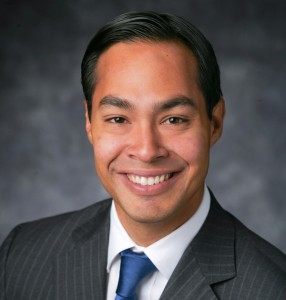 Saying the regulatory ‘pendulum has swung too far in the other direction’ and that it's now ‘too hard’ for most Americans to get approved for a mortgage, Julian Castro, commissioner for the U.S. Department of Housing and Urban Development (HUD), said in a speech last week that more needs to be done to ‘attract private capital back to the market’ and that ‘housing finance reform obviously represents an important step.’
Saying the regulatory ‘pendulum has swung too far in the other direction’ and that it's now ‘too hard’ for most Americans to get approved for a mortgage, Julian Castro, commissioner for the U.S. Department of Housing and Urban Development (HUD), said in a speech last week that more needs to be done to ‘attract private capital back to the market’ and that ‘housing finance reform obviously represents an important step.’
‘A few years ago, bad loans and risky secondary market products prompted a housing crisis,’ Castro said during the recent Bipartisan Policy Center 2014 Housing Summit held in Washington, D.C. ‘There was plenty of blame to go around. Some believe it was too easy to get a home loan.
‘Today, it's too hard,’ he continued. ‘According to the Urban Institute, the average credit score for loans sold to [government-sponsored enterprises Fannie Mae and Freddie Mac] this year is roughly 750. Currently, there are 13 million people with credit scores ranging from 580 to 680.’
Many of these borrowers, Castro said, ‘are ready to own, but are being left out in the cold,’ mainly because mortgage lenders have tightened their credit policies – mostly in response to a string of settlements related to faulty mortgage-backed securities.
Although he didn't back any one specific proposal for housing finance reform, Castro said the Johnson-Crapo bill that earlier this year passed in the Senate Banking Committee ‘was a huge step forward.’
‘Now, we must keep pushing until housing reform legislation gets over the finish line – once and for all,’ Castro told the group.
In the meantime, Federal Housing Administration (FHA) has introduced its ‘Blueprint for Access,’ which aims to free up more credit for lower-income borrowers. This includes the Homeowners Armed With Knowledge program, which offers reduced mortgage insurance premiums to homeowners who complete housing counseling in order to qualify for a FHA loan. It also includes the implementation of proposed new quality assurance measures that will help detect and correct errors in loan files before the loans are sold onto the secondary market.
To that end, Castro said HUD would soon be revising its Loan Quality Assessment Framework, to make it easier for lenders to ‘identify loan defects and determine how serious those defects are.’ This, in turn, will give lenders greater assurance that their FHA-backed loans meet regulatory compliance and that they won't face loan buybacks due to minor errors.
‘By clarifying the compliance process, we're giving lenders the confidence they need to lend, while protecting our financial health,’ Castro said.
The FHA is also overhauling its Single Family Handbook, which ‘brings together 900 mortgagee letters and other policy guidance into a single document. By the end of this month, we'll publish our first section on loan origination through endorsement,’ he said.
‘In the wake of the crisis, we've seen a lot of frustration from lenders when it comes to their FHA business,’ Castro said. ‘Many have been reluctant to lend because they fear unanticipated consequences.’
Indeed, a recent Bloomberg News article reveals that the volume of FHA-backed loans declined 19% in the nine months ending June 30 compared with a year earlier.
Castro pointed to other efforts to give lenders more confidence to free up credit for underserved borrowers, including a new pilot program launched by Ginnie Mae to give small financial institutions more access to the secondary market.
‘In partnership with the Federal Home Loan Bank of Chicago, the effort allows members that do FHA â�¦ Veteran's Administration lending â�¦ and Rural Housing loans to have access to our full-faith and credit guarantee, and get the execution that provides for their loans,’ he said.
‘As a result, participating community lenders will get a better price in the marketplace and use that capital to make credit available for other loans,’ Castro added. ‘Building on this success, we'll be launching a nationwide effort in the first quarter of next year so more lenders can benefit.’
Castro also spoke extensively about HUD's measures to transition more renters into buyers – as well as its efforts to build and refurbish affordable housing developments in order to meet the rising demand for rentals.
‘With all our efforts, I want to send a simple message to lenders: let's work together,’ Castro said. ‘We share a common interest: to see a robust, healthy housing market where those who are ready can buy a home – from the millennial starting out, to the veteran returning from the battlefield, to the couple expecting their first child.  Â
‘We can advance this interest and move our nation forward – but that takes partnership,’ he added. ‘So let's come together to secure the dream of homeownership not only for ourselves, but for generations to come.’
To read Castro's full speech, click here.











